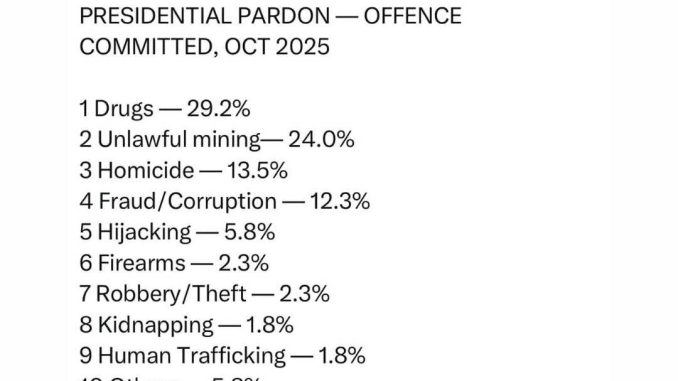
In a move that has ignited fierce national debate, President Bola Ahmed Tinubu has granted clemency to 175 convicts and former inmates, with drug-related offenders emerging as the largest group of beneficiaries, accounting for a staggering 40% of the total pardons.
The decision, announced by the Presidency on Saturday, has drawn sharp criticism from opposition figures, civil society groups, and even some of the president’s allies, who argue it undermines Nigeria’s fight against narcotics trafficking and erodes public trust in the justice system.
The Presidential Advisory Committee on the Prerogative of Mercy, chaired by Attorney-General Lateef Fagbemi, recommended the pardons following a review presented at the Council of State meeting on Thursday.
According to a detailed breakdown released by the Presidency, 70 individuals convicted of drug-related crimes—ranging from possession and trafficking to smuggling—received full pardons, sentence commutations, or clemency.
This category outpaces all others, including illegal mining offenses (34%, or 60 beneficiaries), white-collar crimes, and even high-profile capital cases.
Presidential spokesman Bayo Onanuga defended the exercise in a statement, emphasizing that the beneficiaries demonstrated “genuine remorse, good conduct, and a commitment to reform.” He highlighted the inclusion of historical figures like Sir Herbert Macaulay, whose 1913 colonial-era fraud conviction was posthumously pardoned to “correct historic injustices,” and activists such as Ken Saro-Wiwa and the Ogoni Nine, whose death sentences were symbolically addressed.
Other notable recipients include death row inmate Maryam Sanda, convicted of culpable homicide in 2020 for stabbing her husband, whose sentence was commuted citing family pleas and child welfare concerns. statehouse.gov.ng
However, the prominence of drug offenders has fueled accusations of misplaced priorities.
Atiku Abubakar, the 2023 presidential candidate for the Peoples Democratic Party (PDP), lambasted the pardons as “reckless” and a “mockery of the criminal justice system,” noting that they come amid surging drug abuse among Nigerian youth and ongoing international scrutiny of the country’s narcotics challenges. “At a time when Nigeria reels under insecurity and moral decay, extending clemency to drug traffickers sends a dangerous signal,” Abubakar said in a statement, drawing ironic parallels to President Tinubu’s own past entanglement in a 1990s U.S. drug money forfeiture case.
@atikuSoutheast presidential spokesman Denge Josef Onoh echoed these sentiments, urging Tinubu to reverse pardons for Sanda and the drug convicts, calling them a “moral wrong” that could tarnish the administration’s global image.
Social media erupted with outrage, with users labeling the move “tone-deaf” and questioning its timing amid recent National Drug Law Enforcement Agency (NDLEA) busts, including the arrest of a Kano businessman who excreted 127 cocaine wraps at an airport.
@ARISEtv Posts on X (formerly Twitter) trended under hashtags like #TinubuPardons and #DrugDealersFree, with one user quipping, “Tinubu should pardon him [the Kano suspect]. He is one of our own. Association of drug dealers.”
@kelvinchukuliCritics, including Labour Party supporters, argue the pardons embolden criminality in a nation grappling with banditry, kidnapping, and economic hardship. “Peter Obi would NEVER grant pardon to convicted murderers, drug dealers, and human traffickers,” one X user posted, reflecting broader disillusionment.
@Fattsoul Even some Tinubu backers expressed discomfort, with one admitting, “Tinubu’s supporters are quiet on this pardon issue… How can you pardon murderers, kidnappers, drug dealers?”
@dollings_The Presidency maintains the initiative aligns with constitutional powers under Section 175 of the 1999 Constitution, aimed at rehabilitation and reducing prison overcrowding. Seven death row inmates had their sentences commuted to life imprisonment, and 82 received general clemency, with decisions based on factors like ill health, age, and time served.
As the full list circulates—naming figures like Major General Mamman Vatsa and Professor Magaji Garba among military and academic convicts—the controversy shows no signs of abating, with calls for legislative oversight on future pardons growing louder.
Leave a Reply